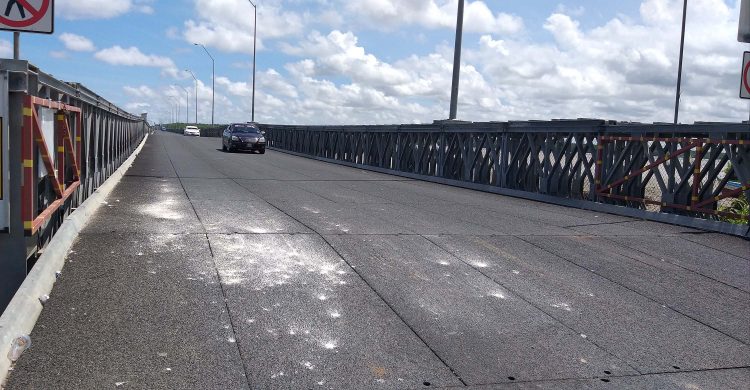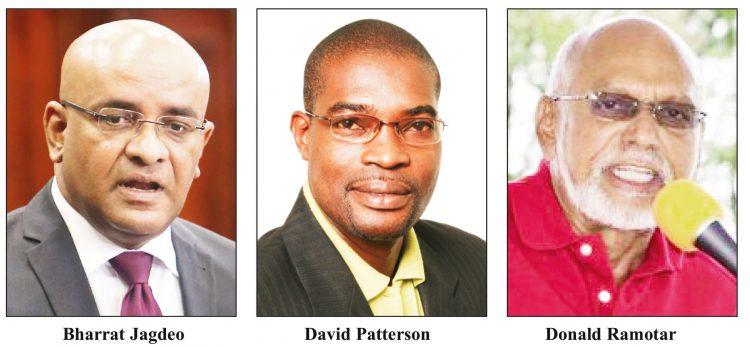November 8 2018
Even as he condemned the takeover of the Berbice Bridge by government, Opposition Leader Bharrat Jagdeo yesterday said that he will also oppose a 19-year contract extension for the Berbice Bridge Company Inc (BBCI).
“The 19 years extension, can that be justified? No,” Jagdeo yesterday told a press conference he held at his Church Street office.
“I don’t believe nineteen years is even practical. That is doubling the life of the extension. That bridge is supposed to come back to us (government) free of cost in twenty years. To give it back to the shareholders for another twenty years, it’s unbelievable and I don’t believe that you need to do that for another nineteen years,” he further stated.

Cars moving along the Berbice River Bridge on Monday
The Opposition Leader said that the bridge company must be held accountable for not attaining its projected figures and should now justify why they need “almost another contract”. He opined that if any extension was to be granted, it should be for no more than two to three years and the company would still have to honour its lowering of the tolls as per the first contract, after the two or three-year period expired. “Maybe in two years or three years so that you don’t have any increase,” he said.
And lacing into government for the takeover which he believes is “nothing but political”, Jagdeo said that the “safety concerns” reason that was cited for the takeover is unwarranted. “They are using this as a political tool; an election gimmick…the bridge is not collapsing,” Jagdeo said.
The Berbice Bridge deal was signed during Jagdeo’s tenure and was severely criticised as a deal made to enrich certain businesspeople. It also resulted in much higher tolls which Berbicians struggled to cope with amid the decline in the sugar and other sectors.
On October 16th 2018, the BBCI announced that it was instituting an approximate 265% across- -the-board increase for tolls, effective November 12th 2018. Government fired back the same day saying that it would fight the increases it termed “draconian” and assured citizens that they would not be paying the proposed increases.
Last week, BBCI proposed that if it was given 19 more years on its original contract, scheduled to expire in 2026, it would not increase the fares. The company asked for a meeting with government on November 5th 2018, to discuss the proposals and Minister of Public Infrastructure David Patterson said he would first have to speak with Cabinet yesterday before he could agree to the meeting.
But on Monday, Patterson issued an order declaring that the functions of the BBCI “to maintain and operate the bridge shall be exercised by the Government of Guyana as of November 5th 2018 until the date the Minister specifies by notice on the cessation of the threat to public safety.”
In announcing that government was assuming the responsibility for maintaining and operating the bridge, the Ministry of Public Infrastructure said the decision was in accordance with powers conferred upon the minister by sections 4 (1) and 11 of the Berbice River Bridge Act.
Daily operations
Responding to questions yesterday posed by this newspaper on what the takeover would mean in terms of daily operations under government, Patterson said, “All tolls and moneys collected or owed is being done as previous arrangements.”
Further, he added, “No funds are paid to the Government of Guyana. All funds remain BBCI. All staff are being paid as [in the] previous arrangement. The GoG collects nor spends any of the money collected.”
On Monday he had written to the Human Resources Officer of BBGI, Amarnauth Singh, in hopes of assuaging the concerns of staff that their jobs might be in jeopardy. He asked that the mail be circulated to all staff so that they are aware firsthand of the security of their jobs. “Please be advised that I wish to reiterate and assure that all employment with the Berbice Bridge Com-pany Inc. is and will remain secure and stable. During this transitional period, please note that there will be no change in staff roles, responsibilities, duties or positions. All staff members are therefore assured of their continuity of service of employment at BBCI.
But even as BBCI maintained that the temporary takeover was unlawful, the company issued a statement saying that it will comply with the decision and will consider whether it will mount a legal challenge based on a response from Patterson, to a request for a justification of the move.
The company said in a statement that based on legal advice received, it considers the Order through which government has assumed control of the bridge to be “unlawful and ultra-vires” under Section 11 of the Berbice River Bridge Act on which it is based.
Jagdeo said that government’s citing safety clauses in the Berbice River Bridge Act was “semantics” for a move that could only be termed political. “You saw what law he is using to take over the bridge. He uses a safeguard there after nationalizing the bridge for a few days. I suspect the takeover will last for the remaining five days before the elections and immediately after, we will return to normal business. The toll will not be adjusted because it can’t be justified,” he said.
While not naming anyone, Jagdeo laid the blame for the increase on the head of BBCI and the National Insurance Scheme, Dr. Surendra Persaud, saying that he is a strong member of the Alliance for Change.
“It didn’t start from the shareholders making an announcement that they wanted a 400% increase. It started from a government official…making this declaration that they want this increase…,”he said.
Investor confidence
But he cautioned government that their taking over of the bridge is likely to hinder investor confidence here, as several other future projects are proposed to be patterned after the public- private partnership model used in the bridge contract.
“This issue about nationalization and taking over private property, we don’t agree with it, because we are seeking similar models to construct other bridges and hydropower and everything else. Was the nationalization justified in this case? Could there be another remedy? Yes, the Minister already had the Act where he did not have to sign the toll order. Any increase where the Minister did not sign the toll order according to the act would have been unlawful. So he didn’t need to take over the operations of the bridge…all he had to say is ‘I am not signing any toll order’”, Jagdeo stressed.
He said that the management of the Bridge should explain to the public why after so many years and with revenues more than projected when the contract was signed, they still are not turning a profit.
“They need to explain, how in the face of increased revenue they can’t meet their obligations. It is a management issue. They have to demonstrate what happened there. It should not be the other way around but we have incompetent people.
The company has said that it had made an attempt to have the increases instituted, as per the contract, in 2014 under the People’s Progressive Party/Civic government. There are differing views over this.
Former President Donald Ramotar, who was President at the time, said that a formal request was not made but that the company met with his cabinet and the matter came up.
“They didn’t make a formal proposal. The whole cabinet met with the Board and the matter came up there and we spoke about the possibility about restructuring the loan to run the bridge and keep the price stable,” Ramotar recalled yesterday.
Asked about the restructuring proposed then, he pointed to a letter he had recently written to this newspaper where he said that the increases could have been avoided if government had followed his party’s financial model for the bridge.
“It was to do with a sort of levelling of the tolls. If you had debt in 2014, 2015, 2016 you take some of that and you refinance it for a longer period at a lower interest rate. Part of the reason was to pay the debt maturing but you would still get the bridge back in 2026,” he said.
In his letter he explained “In 2014, when I was President, we met with the Berbice Bridge Board with the objective of finding ways to avoid a toll increase while at the same time ensuring that the Berbice Bridge was able to honour its obligations. We viewed the toll levels like the way GPL handled its tariffs to maintain a constant level of tariffs, despite rising and falling oil prices. Our solution was simple—given that tolls were only going up to secure cash to reduce debt, Government would support investors, reinvesting some monies at a lower interest rate, and have this repaid in the last few years of the bridge concession. Under this scenario, tolls would not go up, but it would also not go down as quickly as projected. Other solutions included increasing the life of the concession, but this was viewed as less preferable than solutions possible over the remaining life of the concession.”
In 2006, every investor received a financial model that contained a toll index. I have no doubt that the PPP has no objection to this model being made public. The financial model showed that tolls would remain constant until 2014. In 2014, tolls were scheduled to increase by 6.4 per cent and again in 2015 by 17.3 per cent. Thereafter, tolls would start dropping.
Ramotar said that by 2019, tolls were projected to be lower than 2008, and by 2021, tolls were projected to be substantially below where it was in 2008, falling over 40 per cent over 2020.
He, too, is adamant that government should not heed the request for a 19-year increase since he said the bridge is exceeding the projections of the contract as is.
“No I do not believe they need 19 years. When it comes to these projects you look at cash flow, depreciation and amortization. They can work the numbers and have no increase and the bridge can still go back to government in 2026,” he said.





